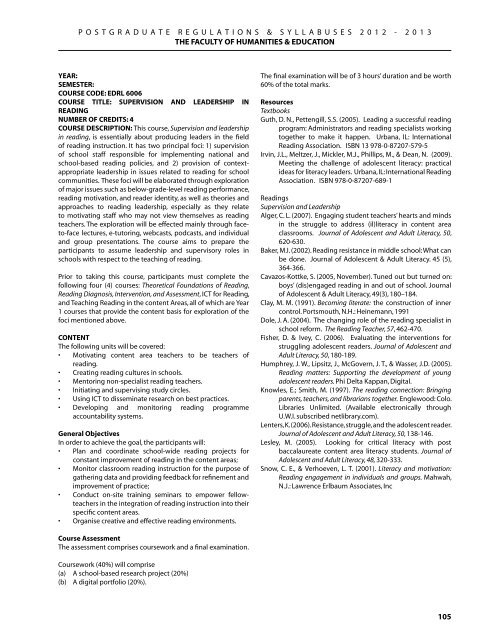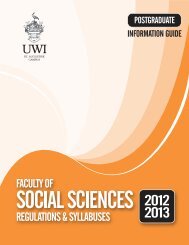Faculty of Humanities and Education (Postgraduate) - The University ...
Faculty of Humanities and Education (Postgraduate) - The University ...
Faculty of Humanities and Education (Postgraduate) - The University ...
Create successful ePaper yourself
Turn your PDF publications into a flip-book with our unique Google optimized e-Paper software.
POSTGRADUATE REGULATIONS & SYLLABUSES 2012 - 2013<br />
THE FACULTY OF HUMANITIES & EDUCATION<br />
YEAR:<br />
SEMESTER:<br />
COURSE CODE: EDRL 6006<br />
COURSE TITLE: SUPERVISION AND LEADERSHIP IN<br />
READING<br />
NUMBER OF CREDITS: 4<br />
COURSE DESCRIPTION: This course, Supervision <strong>and</strong> leadership<br />
in reading, is essentially about producing leaders in the field<br />
<strong>of</strong> reading instruction. It has two principal foci: 1) supervision<br />
<strong>of</strong> school staff responsible for implementing national <strong>and</strong><br />
school-based reading policies, <strong>and</strong> 2) provision <strong>of</strong> contextappropriate<br />
leadership in issues related to reading for school<br />
communities. <strong>The</strong>se foci will be elaborated through exploration<br />
<strong>of</strong> major issues such as below-grade-level reading performance,<br />
reading motivation, <strong>and</strong> reader identity, as well as theories <strong>and</strong><br />
approaches to reading leadership, especially as they relate<br />
to motivating staff who may not view themselves as reading<br />
teachers. <strong>The</strong> exploration will be effected mainly through faceto-face<br />
lectures, e-tutoring, webcasts, podcasts, <strong>and</strong> individual<br />
<strong>and</strong> group presentations. <strong>The</strong> course aims to prepare the<br />
participants to assume leadership <strong>and</strong> supervisory roles in<br />
schools with respect to the teaching <strong>of</strong> reading.<br />
Prior to taking this course, participants must complete the<br />
following four (4) courses: <strong>The</strong>oretical Foundations <strong>of</strong> Reading,<br />
Reading Diagnosis, Intervention, <strong>and</strong> Assessment, ICT for Reading,<br />
<strong>and</strong> Teaching Reading in the content Areas, all <strong>of</strong> which are Year<br />
1 courses that provide the content basis for exploration <strong>of</strong> the<br />
foci mentioned above.<br />
CONTENT<br />
<strong>The</strong> following units will be covered:<br />
• Motivating content area teachers to be teachers <strong>of</strong><br />
reading.<br />
• Creating reading cultures in schools.<br />
• Mentoring non-specialist reading teachers.<br />
• Initiating <strong>and</strong> supervising study circles.<br />
• Using ICT to disseminate research on best practices.<br />
• Developing <strong>and</strong> monitoring reading programme<br />
accountability systems.<br />
General Objectives<br />
In order to achieve the goal, the participants will:<br />
• Plan <strong>and</strong> coordinate school-wide reading projects for<br />
constant improvement <strong>of</strong> reading in the content areas;<br />
• Monitor classroom reading instruction for the purpose <strong>of</strong><br />
gathering data <strong>and</strong> providing feedback for refinement <strong>and</strong><br />
improvement <strong>of</strong> practice;<br />
• Conduct on-site training seminars to empower fellowteachers<br />
in the integration <strong>of</strong> reading instruction into their<br />
specific content areas.<br />
• Organise creative <strong>and</strong> effective reading environments.<br />
Course Assessment<br />
<strong>The</strong> assessment comprises coursework <strong>and</strong> a final examination.<br />
Coursework (40%) will comprise<br />
(a) A school-based research project (20%)<br />
(b) A digital portfolio (20%).<br />
<strong>The</strong> final examination will be <strong>of</strong> 3 hours’ duration <strong>and</strong> be worth<br />
60% <strong>of</strong> the total marks.<br />
Resources<br />
Textbooks<br />
Guth, D. N., Pettengill, S.S. (2005). Leading a successful reading<br />
program: Administrators <strong>and</strong> reading specialists working<br />
together to make it happen. Urbana, IL: International<br />
Reading Association. ISBN 13 978-0-87207-579-5<br />
Irvin, J.L., Meltzer, J., Mickler, M.J., Phillips, M., & Dean, N. (2009).<br />
Meeting the challenge <strong>of</strong> adolescent literacy: practical<br />
ideas for literacy leaders. Urbana, IL: International Reading<br />
Association. ISBN 978-0-87207-689-1<br />
Readings<br />
Supervision <strong>and</strong> Leadership<br />
Alger, C. L. (2007). Engaging student teachers’ hearts <strong>and</strong> minds<br />
in the struggle to address (il)literacy in content area<br />
classrooms. Journal <strong>of</strong> Adolescent <strong>and</strong> Adult Literacy, 50,<br />
620-630.<br />
Baker, M.I. (2002). Reading resistance in middle school: What can<br />
be done. Journal <strong>of</strong> Adolescent & Adult Literacy. 45 (5),<br />
364-366.<br />
Cavazos-Kottke, S. (2005, November). Tuned out but turned on:<br />
boys’ (dis)engaged reading in <strong>and</strong> out <strong>of</strong> school. Journal<br />
<strong>of</strong> Adolescent & Adult Literacy, 49(3), 180–184.<br />
Clay, M. M. (1991). Becoming literate: the construction <strong>of</strong> inner<br />
control. Portsmouth, N.H.: Heinemann, 1991<br />
Dole, J. A. (2004). <strong>The</strong> changing role <strong>of</strong> the reading specialist in<br />
school reform. <strong>The</strong> Reading Teacher, 57, 462-470.<br />
Fisher, D. & Ivey, C. (2006). Evaluating the interventions for<br />
struggling adolescent readers. Journal <strong>of</strong> Adolescent <strong>and</strong><br />
Adult Literacy, 50, 180-189.<br />
Humphrey, J. W., Lipsitz, J., McGovern, J. T., & Wasser, J.D. (2005).<br />
Reading matters: Supporting the development <strong>of</strong> young<br />
adolescent readers. Phi Delta Kappan, Digital.<br />
Knowles, E.; Smith, M. (1997). <strong>The</strong> reading connection: Bringing<br />
parents, teachers, <strong>and</strong> librarians together. Englewood: Colo.<br />
Libraries Unlimited. (Available electronically through<br />
U.W.I. subscribed netlibrary.com).<br />
Lenters, K. (2006). Resistance, struggle, <strong>and</strong> the adolescent reader.<br />
Journal <strong>of</strong> Adolescent <strong>and</strong> Adult Literacy, 50, 138-146.<br />
Lesley, M. (2005). Looking for critical literacy with post<br />
baccalaureate content area literacy students. Journal <strong>of</strong><br />
Adolescent <strong>and</strong> Adult Literacy, 48, 320-333.<br />
Snow, C. E., & Verhoeven, L. T. (2001). Literacy <strong>and</strong> motivation:<br />
Reading engagement in individuals <strong>and</strong> groups. Mahwah,<br />
N.J.: Lawrence Erlbaum Associates, Inc<br />
105

















